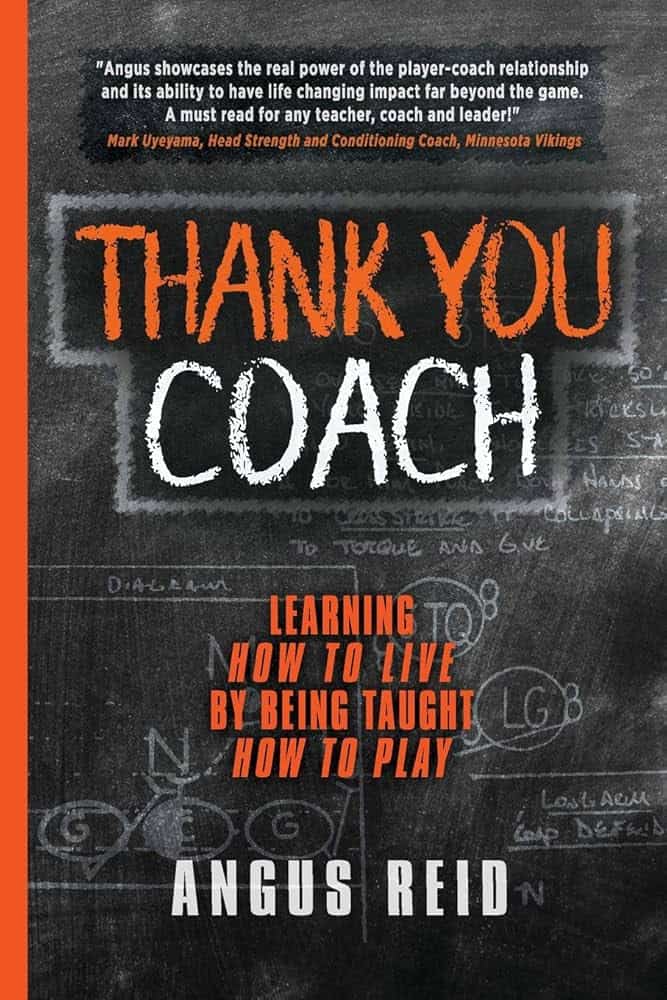Leadership Lessons
“Thank You Coach: Learning How to Live by Being Taught How to Play” by Angus Reid delves into the essence of effective leadership through the lens of coaching. Reid’s insights, drawn from his experiences, offer profound lessons applicable to leaders across various domains. Through a series of poignant quotes and reflections, Reid discusses the enduring importance of trust, communication, and appreciation in fostering remarkable team dynamics.
Trust: Building Trust and Buy-In
Reid emphasizes the foundational role of trust, asserting, “TRUST. Five letter word. Easy to say. Hard to do.” Leaders are prompted to consider actions that authentically demonstrate care for individual team members, fostering genuine buy-in.
Questions to consider:
- How can leaders prioritize building trust from the outset of their interactions with team members?
- What actions demonstrate genuine care for individual team members and contribute to buy-in?
Communication: Adapting Coaching
In navigating the complexities of communication, Reid highlights the need for adaptable coaching styles, noting, “Standards have to be objective but coaching has to be subjective.” Through tailored communication, leaders can cultivate understanding and rapport with team members.
Questions to consider:
- How can leaders tailor coaching and communication styles to meet the diverse needs of team members?
- How can leaders ensure that coaching remains subjective while upholding objective standards?
Questions: The Value of Questions
Reid advocates for the transformative power of questions, urging leaders to inquire about “Hero, Hardships, and Highlights.” By asking the right questions, leaders can foster deeper connections and empower team members to take ownership of their development.
Questions to consider:
- What approaches can leaders take to ask questions that facilitate genuine connection and understanding?
- How can asking the right questions empower team members to take ownership of their development?
Questions: The Power of What?
Delving into the potency of open-ended queries, Reid underscores the importance of “What?” questions in fostering robust dialogue devoid of judgment. Leaders are encouraged to frame questions effectively to elicit honest responses.
Questions to consider:
- How do open-ended “What?” questions contribute to fostering honest and robust dialogue within teams?
- What strategies can leaders employ to frame questions effectively and remove judgment?
Appreciation: Public and Private Praise
Reid underscores the impact of appreciation, asserting, “What gets praised, gets repeated.” Public acknowledgment serves as a catalyst for reinforcing positive behaviors within teams. Yet, the balance between public and private praise warrants consideration.
- Why is public praise important for reinforcing positive behaviors, and how can leaders strike a balance with private appreciation?
- How can leaders ensure that public praise effectively reinforces desired behaviors within their teams?
In exploring the potency of private praise, Reid elucidates its profound impact on fostering trust and confidence among team members. Simple gestures, such as handwritten notes, leave enduring impressions.
Questions to consider:
- How can leaders ensure consistency in delivering personal, one-on-one praise to individuals?
- What strategies can leaders employ to make private praise meaningful and impactful for individual team members?
Reinforcement: Frequency and Consistency
Reid underscores the significance of consistent communication and reinforcement, noting, “You can always trust patterns.” Leaders are urged to authentically maintain a pattern of praise and recognition to foster trust and alleviate anxiety within teams.
Questions to consider:
- What role does consistent communication play in reinforcing trust, and how can leaders ensure authenticity in their interactions?
- How can leaders maintain a pattern of consistent praise and recognition, especially during challenging times?
Goal Setting: Raising the Bar and Building Confidence
Reid champions the role of goal setting in challenging teams and instilling confidence. Leaders are prompted to involve team members in setting stretch goals, thereby fostering belief in their capabilities.
Questions to consider:
- How can leaders effectively challenge their teams with stretch goals while nurturing confidence?
- What strategies enable leaders to involve team members in setting their own goals effectively?
3 Qualities of a Great Coach
Reid encapsulates the essence of effective coaching, emphasizing qualities such as genuine care, credibility, and accountability. Leaders are encouraged to prioritize the well-being and development of their team members, embodying the spirit of service leadership.
Questions to consider:
- What actions demonstrate a leader’s commitment to embodying these qualities, and how can they integrate them into their leadership approach?
- How can leaders cultivate an environment that fosters genuine care, credibility, and accountability among team members?
“Thank You Coach” serves as a profound exploration of leadership principles distilled from the realm of coaching. Through Angus Reid’s poignant reflections and timeless wisdom, leaders are equipped with invaluable insights into fostering trust, communication, and appreciation within their teams. By embracing these principles, leaders can cultivate environments where individuals thrive, achieving remarkable outcomes under their guidance.

Sofia and Linda at Lead Vantage
If you’re inspired to delve deeper into the principles of leadership outlined by Angus Reid, consider reaching out to Lead Vantage for further guidance, coaching, and training. Lead Vantage offers a wealth of resources and expertise to help you build the culture you aspire to lead. Book a free consultation today and take the first step towards realizing your leadership potential.




